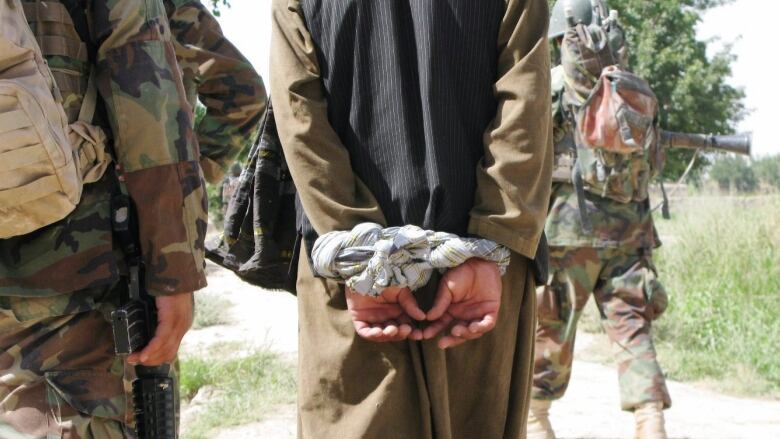Military watchdog limits investigation of complaint into Afghan prisoner abuse
Canada's treatment of detainees is being probed once again after an anonymous tip

The scope of an investigation into the treatment of suspected Taliban prisoners during the Afghan war will not be as broad as originally expected, the civilian agency overseeing complaints against military police said Thursday.
The Military Police Complaints Commission says it can only review why the investigative arm of the Canadian Forces chose not to lay charges in an allegedincident that took place in Kandahar during the closing phase of the army's combat mission.
An anonymous complaint was filed with the watchdog, which alleged prisoners were abused during Canadian military police raids on their cells at Kandahar Airfield in 2010 and 2011.
- No need for inquiry into Afghan detainee torture, Liberals say
- Ex-NDPMP'se-petition on abuse puts Liberals on the spot
The commission has hired two investigators and interviewed a number of individualswho were aware of the raids and who said that several detainees were so scared they defecated and urinated.
The watchdog had been examining whetherthe raids were an "inappropriate or illegal" exercise,whether the Canadian Forces National Investigation Service (CFNIS) conducted an adequate follow-up investigation,and whether the military police officer failed to properly address the matter.
On Thursday, the commission said it has concluded it only has the jurisdiction to investigate whether the CFNIS failed in its responsibility.
Prisoner transfers
Thatdecision may disappoint the "complainant and others who may have similar concerns," said the ruling. "This is the result of legislation and regulations, as interpreted by the courts, and as applicable in this case."
The watchdog pledged to "conduct a thorough and complete investigation of all matters within its jurisdiction."
It is the second time in the last decade that the commission has grappled with the issue of how suspected Taliban prisoners were treated by the Canadian military.
The commission conducted what was originally a sweeping review of the federal government and the army's policy of transferring prisoners to Afghan custody during the war. Human rights groups tried to halt the practice, claiming the detainees faced the likelihood of torture.
Clashes with former prime minister Stephen Harper's governmentabout its refusal to turn over documentsled to a political crisis in 2009 thatalmost toppled the minority Conservatives.
The watchdog faced court challenges by the federal government which narrowed the scope of its investigation and clearly defined its jurisdiction.
It was limited, at the time, to looking at whether military police knew or ought to have known that prisoners faced the possibility of torture.
The commission's fight concluded in June 2012 when its final report found no wrongdoing by military cops, but "identified serious problems regarding reporting, accountability and information sharing."
Lingering questions
The latest complaint was filed and the latest investigation launched in 2015.
Last year, Postmedia reported on internal defence documents that suggested the cell raids were training exercises that had become "out of control" and that military police conducting them "lacked guidance and oversight."
The issue of how Afghan prisoners were treated has lingered even though Canadian troops withdrew from the country in 2014.
Last spring, the Liberal government declined to hold a public inquiry after a former New Democrat MP received hundreds of signatures on a petition.
Craig Scott, who represented the NDP in the riding of Toronto-Danforth until 2015, has also filed a complaint with the federal conflict of interest commissioner over the matter.
It was Defence Minister Harjit Sajjan who decided not to hold the inquiry, and Scott argues that was inappropriate.
Sajjan served as an army intelligence and liaison officer during the war, something Scott says should have disqualified him from making such a decision.












_(720p).jpg)


 OFFICIAL HD MUSIC VIDEO.jpg)
.jpg)



























































































